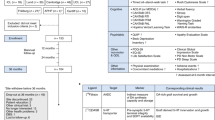Abstract.
Embryonic dopamine cell transplants survive in nearly all patients regardless of age and without immunosuppression. Transplants can improve Parkinson “off” symptoms up to the best effects of L-dopa observed preoperatively. They cannot improve the “best on” state. Transplants appear to survive indefinitely. In 10 to 15% of patients, transplants can reproduce the dyskinetic effects of L-dopa even after discontinuing all L-dopa. Neurotransplantation should be tried earlier in the clinical course of Parkinson’s to see if earlier intervention can prevent progression of the disease, particularly the dyskinetic responses seen after longterm L-dopa treatment.
Similar content being viewed by others
Author information
Authors and Affiliations
Corresponding author
Rights and permissions
About this article
Cite this article
Freed, C.R., Leehey, M.A., Zawada, M. et al. Do patients with Parkinson’s disease benefit from embryonic dopamine cell transplantation?. J Neurol 250 (Suppl 3), iii44–iii46 (2003). https://doi.org/10.1007/s00415-003-1308-5
Issue Date:
DOI: https://doi.org/10.1007/s00415-003-1308-5




